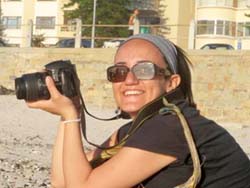The ongoing Freedom Waves campaign to break the siege of Gaza hit the world headlines last week with the attempt by the Canadian Tahrir and the Irish Saoirse—Arab and Irish for freedom—to bring aid to Gazans directly. This time the boats left from Turkey, not Greece, where last June authorities refused to let the Freedom Flotilla depart.
“Our efforts in Greece only fuelled our determination to challenge the imprisonment of the people of Gaza. We said we would continue to sail and so we are,” according to a Freedom Waves press statement.
This time there were 27 activists, including Americans, Canadians, Irish, Polish, Greek, Palestinian and—for the first time an Egyptian, Al-Masri Al-Youm English Managing Editor Lina Attalah. For 27 years, Israel has been violating the 1979 Peace Treaty with Egypt, which guaranteed “full autonomy” for the Palestinians within five years. So it was appropriate for an Egyptian to become the 27th member of the team of activists trying to break the Gaza siege.
Tahrir passenger Kit Kittredge said, “In our sails is the wind of worldwide public opinion which has turned against the illegal blockade.” Retired US army colonel Ann Wright said, “We carry inspiration from the Arab Spring and the worldwide Occupy movements. Where governments fail, civil society must act. We will not stand by and watch $30 billion of our tax money committed to buying Israel weaponry used to carry out this illegal occupation of Palestine.”
Attalah described how, as Israel warships approached, activists and journalists started throwing equipment into the sea, “fearing that the information stored on them could be used to implicate other activists who were not on board.” When the Israel military asked their destination, organiser Ehab Lotayef replied first, “The conscience of humanity,” and as the Israelis sprayed the peaceful protesters with salt water, “The betterment of mankind.” Attalah counted 15 ships, with “dozens of Israeli soldiers pointed their machines guns at us.”
Their communications system was jammed and they entered the Israel no-mans land. But not without an Israeli practical joke. The Israelis “offered to send one person to inspect for weapons, and if he found nothing, they would let us pass.”
But the ships were suddenly ordered to proceed to Ashdod in Israel, and when the order was ignored, the Israelis boarded the ships, brandishing guns, ready to shoot anyone resisting, and using tear gas and tasers. The Tahrir and the Saoirse were forced to crash into each other, crippling both ships, and their engine rooms flooded, exposing them to the danger of sinking.
What equipment had not been thrown overboard was stolen by the pirates. Israeli Mad Kayal said, “As a Palestinian, I was not surprised at how the IDF treated us; however, for the Canadians and other Westerners onboard, it was a complete shock.” President of the European Parliament Jerzy Buzek, who in the past called Israel “an indispensable partner for the EU,” refused to criticise his “partner” for the arrest and imprisonment of Irish Euro MP Paul Murphy for three days.
In contrast, Attalah was treated with kid gloves, and—without any exchange of Israeli spies—was taken by an Egyptian embassy official to the border at Taba. She was upbeat in her report, relating how they got much closer this time—50 km as opposed to 100 km in the past, and how Jewish activists, preparing for the expected Israeli attack, helped translate slogans “This is piracy” and “This is kidnapping” into Hebrew to greet the Israelis.
Shamefully, US State Department official Victoria Nuland warned activists, they “could face civil and criminal penalties in their efforts to deliver resources to the Gaza Strip,” and the US consul in Israel advised them to sign an Israeli deportation agreement. The activists refused, as the statement said they entered Israel illegally and would not attempt another effort to break the Gaza blockade, thereby giving de facto credibility to the seige.
Absurdly, US House Resolution 3131 introduced last month would require the State Department to investigate “the sources of any logistical, technical, or financial support for the Gaza flotilla ships” and produce “a report on whether any support organisation that participated in the planning or execution of the recent Gaza flotilla attempt should be designated as a foreign terrorist organisation.”
The story did not end with the deportation of the plucky activists. Israel cyerwarfare expertise is well known, but so is that of computer hackers Anonymous. They decided to avenge the Freedom Wavers, warning the Israeli military hours before they seized the ships: “If you continue blocking humanitarian vessels to Gaza then you will leave us no choice but to strike back. Again and again, until you stop.”
A few days later, over a dozen Israeli government websites crashed, including Shin Bet, Mossad, the IDF, the Health, Justice Housing, Science and Sports Ministries, the President’s Residence, the Immigration Authority, the Israel Land Administration and the Atomic Energy Commission. As Jewish philosopher Hillel the Elder said, “Do unto others as you would have them do unto you.”
Freedom Waves will continue to lap against Israeli gunships in their attempt to reach the shores of Gaza. There are tentative plans for a “Sailing for Freedom” yacht race next summer from Marseille France, a kind of Tour de Méditerranée, going to Algeria, Tunisia, Egypt and on to Palestine. Turkey has committed itself to protect future naval convoys breaking the siege.
Land convoys are also being organised. The British group Long Live Palestine has called on people around the world to take part in a convoy of medical aid to break Israel’s blockade on Gaza, starting 27 December. Organisers are planning for Viva Palestina 6—Return Convoy to be the biggest convoy of aid yet, and hope to involve Egyptians again and enter via the Rafah crossing.
Eric Walberg writes for Al-Ahram Weekly. You can reach him at ericwalberg.com. His book, “Postmodern Imperialism: Geopolitics and the Great Games, is available at Clarity Press.



